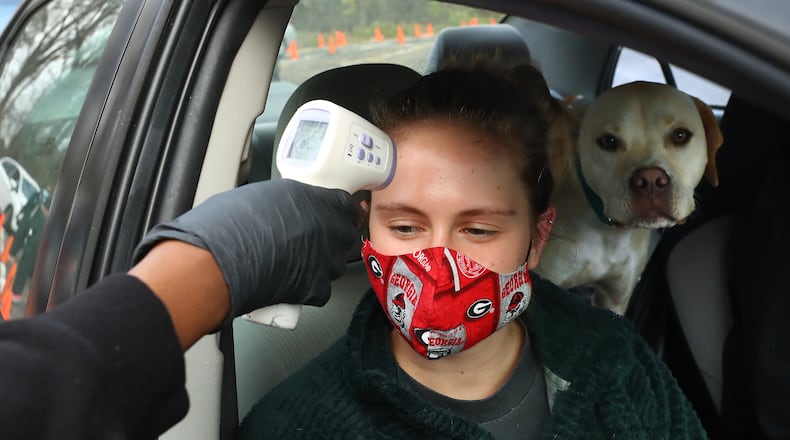COVID-19 hospitalizations continue to climb in Georgia, particularly in the metro Atlanta area, as the fast-moving omicron variant marches across the state.
The state plans to deploy 200 Georgia National Guard troops to assist testing centers and hospitals. Many facilities are struggling with overcrowded emergency rooms and hectic intensive care wards just as they are dealing with staff shortages.
Omicron spreads faster than previous coronavirus variants, though at least early indications are that many patients generally have less severe symptoms. Early evidence suggests the omicron typically causes mild illness, especially for those who are vaccinated or previously had a COVID-19 infection. Boosters also appear to be effective in preventing serious illness and hospitalizations.
Still, health officials warn the more contagious variant could swamp hospitals given omicron’s rapid spread and the large numbers in the population who are infected, even if a smaller percentage of infections lead to hospitalization.
“We are in the thick of this and I don’t think we are done with this (surge) for at least two weeks,” Dr. Felipe Lobelo, an epidemiologist at Kaiser Permanente of Georgia, said Tuesday of coronavirus infections. “I think we are not necessarily hitting the panic button yet, but we are obviously monitoring these mega trends.”
Here’s a look at major developments related to COVID-19 over the past week.
Troops on their way to assist
Gov. Brian Kemp recently announced his plan to deploy 200 National Guard troops, with about half going to assist testing centers and the other half to hospitals. The governor also said the state would spend $100 million in federal pandemic rescue funds to hire about 1,000 contract health workers for 13 weeks.
Credit: Ben Gray
Credit: Ben Gray
In an update on assistance from National Guard troops, a spokesperson for the governor’s office said 96 troops will be assigned to support 16 Department of Public Health testing sites around the state, as well as assist with needs at the department’s warehouse, and 102 personnel will be assigned to support 11 hospital facilities, including Grady Health System, Piedmont Atlanta, and the Northeast Georgia Medical Center. They hope to have all assignments filled by mid-January.
New Atlanta mayor extends COVID-19 mask mandate
In his first hours after being sworn in as Atlanta’s 61st mayor, Andre Dickens signed two executive orders to renew the city’s emergency measures in response to the pandemic.
Dickens extended Atlanta’s mandate requiring people to wear masks in all indoor public spaces, including inside private businesses, according to an order obtained by The Atlanta Journal-Constitution.
The mandate empowers the city to issue $25 fines and $50 fines to anyone who fails to put on a mask after being given a warning, according to the order signed by Dickens.
Credit: Ben Gray
Credit: Ben Gray
Additionally, City Hall and other city facilities will remain open in a limited manner for some in-person transactions, but this rule won’t apply to the Municipal Court, Lakewood Amphitheater, or Chastain Amphitheater, according to the order.
Dickens also extended the city’s internal incentive program, which gives employees a $100 bonus if they get the coronavirus vaccine and the booster shot by June 30, according to the order.
MARTA cancels train trips amid COVID-related staffing shortage
On Monday, MARTA announced the cancellation of several night trips on its north-south and east-west lines as COVID-19 continues to take a toll on staffing. It canceled more later in the week.
MARTA spokesperson Stephany Fisher said 13 rail operators were out sick because of COVID, but another 25 positions are vacant.
Staffing shortages caused by the coronavirus pandemic have already forced MARTA to reduce the frequency of service on 96 of its 113 bus routes. Through Monday, 1,203 MARTA employees have tested positive for COVID-19 during the pandemic.
MARTA urged passengers to allow extra time to complete their trips.
Transit is just one public service that has been disrupted during the pandemic. Amid the latest surge, several school districts have announced they’re switching to online-only classes to begin the new year. Staffing shortages and bad weather have also led airlines to cancel flights.
CDC expands boosters for children as young as 12
The Centers for Disease Control and Prevention endorsed an extra Pfizer vaccine shot for younger teens — those ages 12 to 15 — and strengthened its recommendation that 16- and 17-year-olds get it, too.
Earlier in the week, the Food and Drug Administration has expanded eligibility for Pfizer booster doses for children as young as 12.
The FDA also said everyone 12 and older who’s eligible for a Pfizer booster can get one as early as five months after their last dose rather than six months.
FDA vaccine chief Dr. Peter Marks said even though serious illness is uncommon in younger teens, a booster will further reduce that risk, while also helping reduce the spread of the virus.
The FDA based its latest booster decision largely on real-world data from Israel that found no new safety concerns when 6,300 children ages 12 to 15 got a Pfizer booster five months after their second dose.
The Associated Press and Staff writers Wilborn P. Nobles III, David Wickert and Jeremy Redmon contributed to this report
BY THE NUMBERS
1-2 days: How much faster a mouth swab may detect omicron than a nasal swab.
3 days: Average lag time between when a rapid antigen test (using a nasal swab) detected omicron, compared to a PCR or lab test, based on a study not yet peer-reviewed.
12 times: How much more likely a saliva swab was to detect COVID-19 in early stages of infection compared to a nasal swab, according to University of Maryland research.
Sources: Infectious Economics LLC, the Yale School of Public Health and others.
The Latest
Featured




